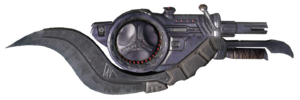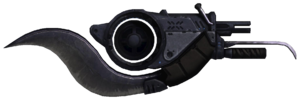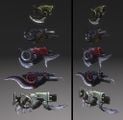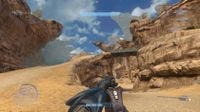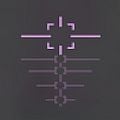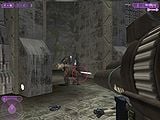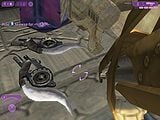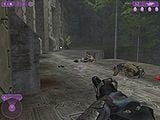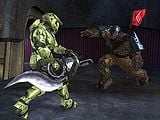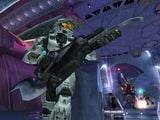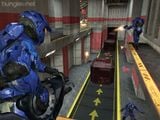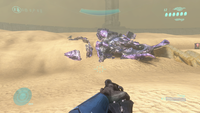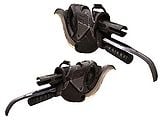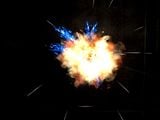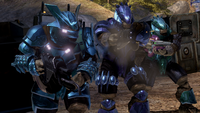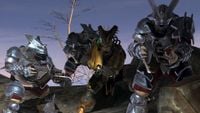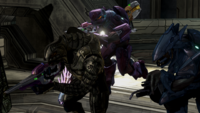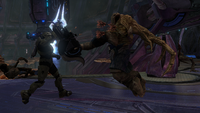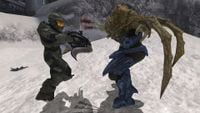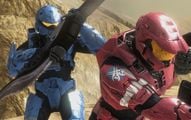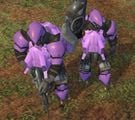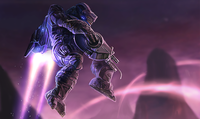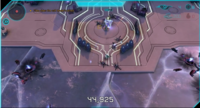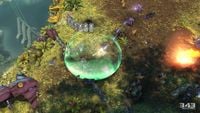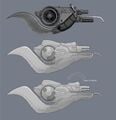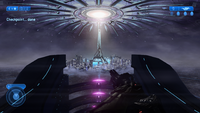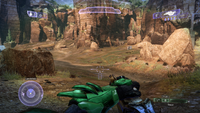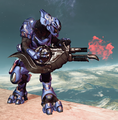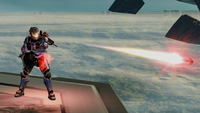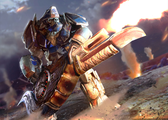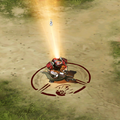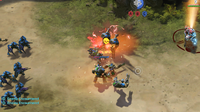Jovokada Workshop brute shot: Difference between revisions
From Halopedia, the Halo wiki
m (Text replacement - "(cancelled game)" to "(canceled game)") |
Sith Venator (talk | contribs) |
||
| Line 159: | Line 159: | ||
*''[[Halo: Divine Wind]]'' | *''[[Halo: Divine Wind]]'' | ||
*''[[Halo: The Rubicon Protocol]]'' | *''[[Halo: The Rubicon Protocol]]'' | ||
*''[[Halo: Age of Retribution]]'' | |||
==Sources== | ==Sources== | ||
Latest revision as of 12:12, November 8, 2024
| Jovokada Workshop Death Lobber | |
|---|---|
| Production overview | |
|
Manufacturer: |
|
|
Type: |
|
| Specifications | |
|
Length: |
|
|
Width: |
17.0 centimeters (6.7 in)[5] |
|
Height: |
57.4 centimeters (22.6 in)[5] |
|
Weight: |
|
|
Ammunition type: |
52mm[4] Type-25 Exotic/High-Explosive Antipersonnel Grenade[5] |
|
Feed system: |
|
|
Belt-fed[5] | |
| Service history | |
|
In service: |
|
The Jovokada Workshop Death Lobber (UNSC Type classification: Type-25 Grenade Launcher, T-25 GL),[6] also known as the brute shot, is a Jiralhanae-employed grenade launcher developed by the Jovokada Workshop.[3][1] It was manufactured by the Sacred Promissory in the Covenant,[3] and Jovokada Foundry in the Banished.[1] It is nicknamed Brute Gun, Gerbil Shooter, and Gerbil Launcher.[6]
Overview[edit]
Design details[edit]
The brute shot is a Jiralhanae-designed projectile weapon that is most closely analogous to a UNSC automatic grenade launcher.[4] However, the brute shot features a sharply curved stock-mounted hilt bayonet on its underside,[1] which is a powerful melee weapon made of tungsten-alloy.[2] In the hands of a strong, experienced warrior, the bayonet can easily cut through armor and flesh,[3] allowing the wielder to cleave its victim in two with ease.[1] Despite the brute shot's comparatively large size at six feet long, the Jiralhanae use it more like a rifle than a support weapon;[2] the Jiralhanae carry it low, holding the large, circular firing grip with one hand, while the other hand holds a horizontal foregrip underneath a small bayonet, both of which are underneath the weapon's barrel. Instead of the small foregrip, the Sangheili and Spartans hold the stabilizing grip above the barrel.[2]
Ammunition[edit]
The brute shot fires 52mm high-explosive concussion (HEC) fragmentation grenades,[4] which gave it the nicknames "Gerbil Shooter" and "Gerbil Launcher".[6] Depend on the variant, the brute shot can hold between four to six grenades per magazine,[5] allowing the user to launch up to six grenades in the time span of three seconds.[6] Supplied in belts of three to six grenades, the ammunition is belt-fed through the top of the weapon into the weapon's internal magazine with an autoloader. The brute shot lacks a weapon safety, but its grenades are almost completely inert until primed in the firing chamber. The safety feature appears to be a Covenant modification, so they may be missing on ammunition manufactured after the Human-Covenant War.[4] The brute shot's high-explosive grenades are capable of neutralizing infantry, especially unshielded ones,[3] and disabling vehicles.[1] While one grenade will not destroy a vehicle, the grenade's concussive effect can easily knock one over, forcing the occupants out of the vehicle.[3][2]
Usage[edit]
The brute shot was designed, manufactured, and employed by the Jiralhanae for decades prior to their integration into the Covenant.[2] After they joined the Covenant, the brute shot remained as the most common ballistic launcher utilized by the Jiralhanae,[3] the closest counterpart being the concussion rifle.[8] Favored by Jiralhanae shock troops and siege breakers,[1] the brute shot plays a direct assault role in the arsenal; the Jiralhanae tends to fire grenades at close range to disrupt the enemy as shock troops charge into melee range.[4]
Variants[edit]
The United Nations Space Command's Office of Naval Intelligence recorded two variants of the brute shots. Both models share many components and it is unclear if the Jiralhanae make any distinction between the two variants or if they simply used whichever model is at hand.[5]
- Type-25 Grenade Launcher: The standard model of the Type-25 Grenade Launcher is belt-fed with four grenades. These grenades are primed on impact, which allows them to ricochet off angled surfaces.[5]
- Type-25B Grenade Launcher: This variant is a simplified model that is better suited for mass production. The Type-25B can hold six grenades in an internal magazine. The model's grenades are cheaply-made and explode on impact.[5]
Gameplay[edit]
In Halo 2, the brute shot projectiles fired directly upward will return to the ground after a while. Skilled players can use this as a mortar to flush enemies out of cover. The grenades from the brute shot can also bounce around corners. In Halo 3, brute shots can't bounce off walls and they explode on impact. The melee attack on the brute shot is very deadly, depleting shields with one hit. The brute shot is very hard to aim, as it sometimes drifts. In Halo 3, its fired grenades have a 3-second fuse that causes them to detonate after a certain range. With skill and some luck, the brute shot bayonet can parry Energy Sword lunges if you press the melee button at the correct time. This makes it one of the best weapons to parry a blow from the Energy Sword.
Changes from Halo 2 to Halo 3[edit]
- The brute shot now has a belt of six grenades, two more grenades than in Halo 2.
- Its grenades are now unable to bounce, but instead they explode on impact with any solid surface.
- Each shot does slightly less damage than in Halo 2. On Legendary difficulty, it takes 2 shots to kill a Jackal or even a Grunt Major.
- The projectiles seem to travel generally faster.
- There is no longer a slight delay before the grenade is launched after the trigger is pulled.
- It now has an electrical burst plus the normal explosion when the grenade detonates.
- The downward arc of the shots is greatly decreased, with the rounds barely arcing at all. They are instead propelled like rockets and drift slightly left or right after a set distance. As an additional consequence of the significantly reduced arc, the brute shot's crosshair is now a standard box instead of a tiered rangefinder.
- Projectiles now have timed fuses that cause rounds that do not strike a surface to detonate after 3 seconds. The Halo 2 counterpart does not have a timed fuse- it bounces once before detonating the second time it strikes a surface.
- In Halo 3, it takes 4 out of 6 shots in a belt to kill a player. This has made it harder to kill a target in one belt. There are no noticeable changes in the rate of fire and spare ammo capacity.
- Just one direct shot and a quick follow-up melee will kill a normal-shielded player in Multiplayer.
- Melee attacks are only slightly stronger than the other weapons in Halo 3, but much weaker than the brute shot melee attack in Halo 2.
- The ability to kill a fully shielded multiplayer enemy by punching with the blade in the air after jumping was removed.
- Reserve belts have been reduced by 1 (from 3 to 2 grenade belts) while the number of grenades in each belt is increased from 4 to 6, making for a total ammo increase from 16 to 18.
Trivia[edit]

|
See our gameplay information related to Jovokada Workshop brute shot on its gameplay page. |

|
Browse more images in this article's gallery page. |
- As demonstrated in the Halo 2 E3 demo, the brute shot originally fired large plasma bolts that travel slower and do not bounce from surfaces.
- In both Halo 2 and Halo 3, No matter how many grenades remain in the internal magazine, when the player reloads, the animation always shows the character reloading a full belt of grenades.
- In Halo: Ghosts of Onyx, Frederic-104 calls the brute shot an RPG (rocket-propelled grenade). This is untrue due to the fact that the brute shot grenade is not propelled by a rocket; it is shot out of the weapon with extreme force, more akin to a recoilless rifle, which uses a charge to force the shot out of the weapon.
- In Halo Wars. the brute shot is is referred to as the "Brute gun".
- In both Halo: Spartan Assault and Halo: Spartan Strike, the brute shot is wielded exclusively by Jump pack Brutes. When used by the player, the ammo capacity is capped at 9.
- In Halo 2 Anniversary multiplayer, the brute shot fires grenades that share the same model as the M19 missile, which is what the M41 SPNKr fires. It may have been a placeholder left in the game by mistake.
Gallery[edit]
Development images[edit]
Brute shot variants as they were intended to appear in the Halo MMO.
First-person view of the brute shot on Diamondback in Halo Online.
Halo 2[edit]
John-117, with a brute shot, takes on a Jiralhanae.
A Spartan wielding the brute shot on Midship.
A Spartan wielding the brute shot on Elongation.
Halo 3[edit]
Concept art of a Jiralhanae Chieftain holding a brute shot with a longer blade.
A Jiralhanae Captain Ultra wielding the T-25B brute shot.
Multiple Jiralhanae Bodyguards with the T-25B brute shot.
N'tho 'Sraom wielding the T-25B brute shot.
A Flood-infected Jiralhanae attacker form with the T-25B brute shot.
Halo Wars[edit]
Two Jiralhanae Jumpers with brute shots.
Halo: Spartan Assault and Halo: Spartan Strike[edit]
A Jiralhanae Jumper with a brute shot in Halo: Spartan Assault.
Sarah Palmer using a brute shot against Merg Vol in Halo: Spartan Assault.
A Headhunter using a brute shot in Halo: Spartan Strike.
Halo 2: Anniversary[edit]
Unused concepts of the brute shot for Halo 2: Anniversary.
A Sangheili firing a brute shot on Skyward.
The Halo 2: Anniversary multiplayer brute shot projectile on Skyward.
Halo Wars 2[edit]
Blitz card of an Atriox's Chosen with a brute shot.
List of appearances[edit]
- Halo: First Strike (First appearance)
- Halo 2
- Halo: Ghosts of Onyx
- Halo 3
- Halo Wars
- Halo 3: ODST
- Halo Legends
- Halo: Spartan Assault
- Halo 2: Anniversary
- Halo: Spartan Strike
- Halo: Shadow of Intent
- Halo Wars 2
- Halo: Retribution
- Halo: Meridian Divide
- Halo: Divine Wind
- Halo: The Rubicon Protocol
- Halo: Age of Retribution
Sources[edit]
- ^ a b c d e f g h i j Halo Encyclopedia (2022 edition), page 483
- ^ a b c d e f g h i Halo: The Essential Visual Guide, page 24
- ^ a b c d e f g Halo Encyclopedia (2022 edition), page 295
- ^ a b c d e f g h i Halo: Official Spartan Field Manual, page 196
- ^ a b c d e f g h i j k l Halo Waypoint, Brute Shot (Retrieved on May 14, 2021) [archive]
- ^ a b c d e Halo Encyclopedia (2009 edition), page 326
- ^ Halo 2, campaign level Gravemind
- ^ Halo: Reach, campaign level Exodus
| ||||||||||||||||||||
